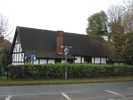 Oldcotes Oldcotes
St Mark
History
Oldcotes was historically a township in the parish of Harworth and because the distance between the village and Harworth All Saints was three miles divine service was held every Sunday in the National School room in Oldcotes from the mid-19th century. However, by the closing years of the 19th century this arrangement was generally viewed as unsatisfactory and plans were put in place 'to raise a sufficient sum for the purpose of building a chapel of ease.' A suitable site at the junction of the main roads through the village was donated by Sydney Jebb of Firbeck Hall and largely thanks to the vicar of Harworth, the Rev E. P. Sandwith, by 1897 £300 had been collected towards the cost of building of a new church.
After five months of building work the church of St Mark was opened by the Bishop of Derby on 17 April 1900. It was designed by Charles Hodgson Fowler of Durham and built by Messrs Kelsey of Goole. The Nottinghamshire Guardian, reporting on the opening day, provides the following description:
'Both externally and internally, the church is attractive and pleasing to the eye, without any pretension to imposing appearances. It is on brick foundations, the superstructure being of wood and cement, and the timbers being pitch pine, Stockholm tarred. The style is imitation early English, and the whole, consisting of nave, chancel, vestiy, and porch, with bell turret at the west end, is roofed with red tiles. Internally, the fittings are neat and convenient. The walls are part painted, part plaster, with a dado of pitch pine, the colouring being uniform of pale blue. The floor is of wood, and the seating, for about 100 persons, is by rows of well-made chairs. It is well lighted, and warmed by means of stoves.'
In 1912, the church was listed as having 100 sittings; 54 scholars were on the roll for the day school and 22 for the Sunday school.
The church is now part of the United Benefice of Carlton-in-Lindrick with Langold and Oldcotes. In 2017 there were two services held at St Mark’s each month on the first and third Sunday.
| 




